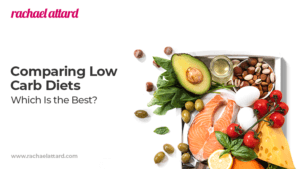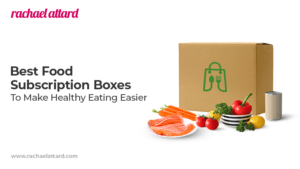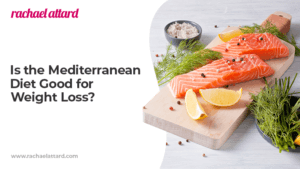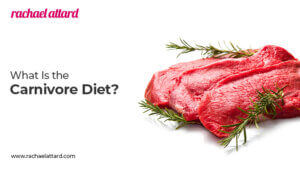Raw Food Diet – Pros and Cons
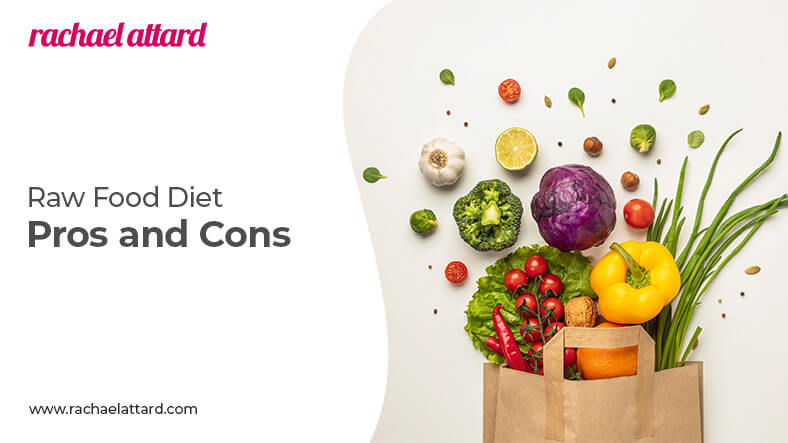
Lately, I’ve been getting questions about the raw food diet. And it seems like more celebrities are starting to incorporate raw foods into their daily routines than ever before.
If you’re considering trying this diet out yourself, you need to make sure it’s the right choice for your goals and your lifestyle.
That means it’s time to take a deep dive into the pros and cons of this diet, how it works, and why it is or isn’t the right choice for your life.
What Is a Raw Food Diet?
The Raw food diet’s been around since the 1880s. Its popularity varied throughout the years and is now more popular again.
According to most dieticians and nutritionists, food is considered “raw” if it’s not cooked at temperatures between 40–48 degrees Celsius or 104-118 degrees Fahrenheit. That does mean that sushi is on the table, but most often, this means you’ll be eating tons of fresh fruits, vegetables, nuts, and grains that you can “cook” without cooking them.
Instead of cooking, you can instead use methods such as juicing, blending, dehydrating, etc. to prepare your food.
In most cases, the raw food diet is plant-based and eliminates foods that have to be cooked or pasteurized to consume safely.
By now, you may be wondering why people would choose to eat this way. Most supporters and advocates of the raw food diet believe that eating foods without cooking them helps you get more nutrients from each item you eat. While it is true that some nutrients are lost, cooking actually increases other nutrients and antioxidants.
The supporters of this diet also believe that cooking food destroys enzymes which boost digestion and health. Again, this is true to a degree. The human body can also produce enzymes that help with digestion and energy.
What Can You Eat on the Raw Food Diet?
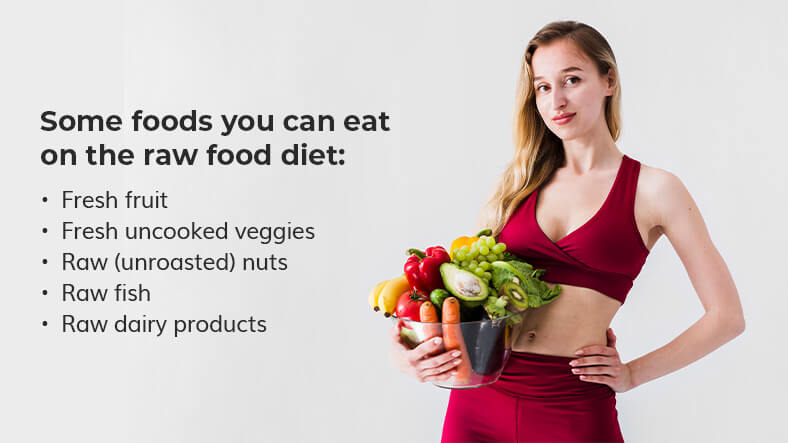
Raw diets limit what you can eat each day. However, you’re free to eat just about any fruit, vegetable, nut, seed, or fresh legume that you can get your hands on.
This means you’re free to eat the following every day:
- Fresh fruit
- Fresh uncooked vegetables
- Raw (unroasted) nuts
- Sprouted grains
- Low-temperature dried fruit
- Homemade nut milks
- Living fermented foods and pickles
- Raw nut butter
- Cold-pressed oils
- Raw fish
- Raw dairy products
Some of these foods are completely safe to consume in their raw state. That said, use caution if you’re going to consume raw fish or raw dairy products. Choose these products from sources you trust and only eat them if you’re not feeling unwell.
Raw fish and raw dairy products can contain bacteria that can make you sick or at least cause some digestive upset if you’re not careful.
What Food Should You Avoid on the Raw Food Diet?
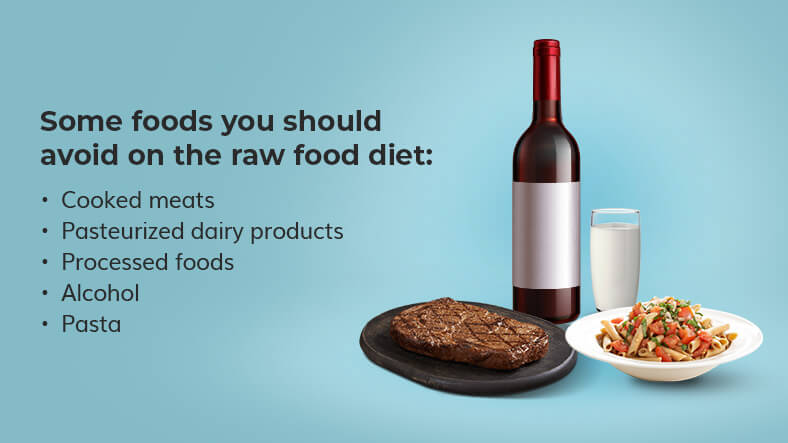
The key to raw food diets is to avoid any foods that have been treated with heat. Unfortunately, this means most convenience foods, cereals, and quick snacks that you don’t prepare yourself are completely off the table.
A few of the foods you’ll need to cut out from your daily diet include the following:
- Cooked meats
- Pasteurized dairy products
- Coffee
- Tea
- Bread
- Pasta
- Alcohol
- Refined or standard cooking oils
- Processed foods
- Refined white sugar
- Refined and enriched flour
- Roasted nuts and seeds
That’s right…if you decide to follow the raw food diet, you’ll have to ditch your caffeine habit as long as you’re on the plan. Now, I love coffee as much as the next girl and, when used in moderation, it has a number of health benefits. So, if you decide to follow this plan, I’d suggest scaling back on your caffeine intake rather than eliminating it altogether.
Otherwise, you risk dealing with serious headaches and other caffeine withdrawal symptoms. And those symptoms can make it hard for you to feel motivated to be active.
How Difficult Is It to Be on a Raw Food Diet?
Being on a raw food diet is definitely a challenge. You’re only able to eat foods that haven’t been exposed to heat. This means you’ll need to spend time preparing food for yourself and your family in other ways.
You won’t easily be able to find prepared foods that are completely raw. Even store-bought salads often contain croutons, cooked eggs, and pasteurized dairy products that you can’t easily pull out.
If you’re willing to plan ahead and put in the time to prepare your meals in advance, it can be beneficial. However, you need to be committed to sticking to the diet plan. If you get tired of putting in the work, it’s easy to fall right back into bad habits.
If you decide to eat out in a restaurant, it’s most likely that you will have a lot of difficulty finding a raw dish on the menu.
Is It Good or Bad for Your Health?
Before you can decide if it’s right for you, you need to understand the pros and cons of the diet itself. While it may have some benefits, for me this diet is risky and you should definitely talk to your doctor first before starting it.
The Pros of a Raw Food Diet
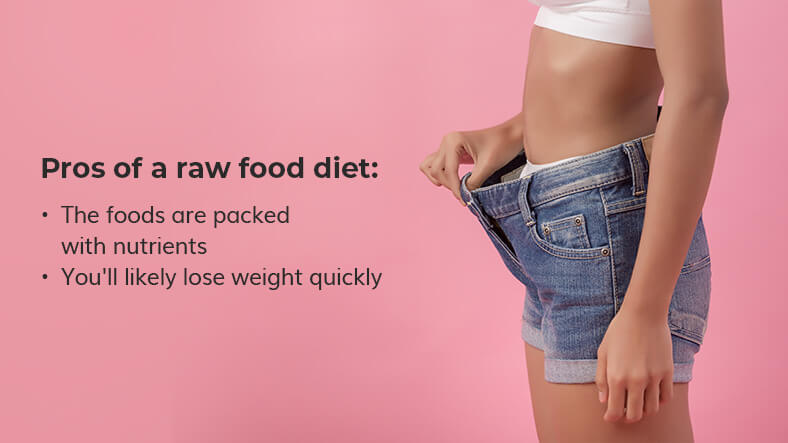
There are some benefits to this fairly restrictive diet protocol:
The Foods Are Packed With Nutrients
Raw fruits, vegetables, legumes, nuts, and seeds are full of beneficial nutrients that can help jumpstart your weight loss and give you a natural boost of energy to help you get through the day. You’ll consume tons of beneficial vitamins and minerals with every meal and snack as long as you follow the plan closely.
You’ll Likely Lose Weight Quickly
Since most raw foods are naturally low-calorie foods, you’ll find it difficult to eat more calories than you burn each day. This means you’ll likely see faster weight loss results while you’re following the diet.
That said, you will need to be mindful of the amount of nuts, nut butters, and oils you consume throughout the day. These are the exception to the rule—they’re calorie dense and, while they’re healthy in moderation, it’s easy to overdo it.
Losing weight this way may not be the healthiest option, and you may also struggle to take in as many calories as you need to go about your day. It’s best to check with your doctor to see if this diet will have benefits for you.
The Cons of a Raw Food Diet
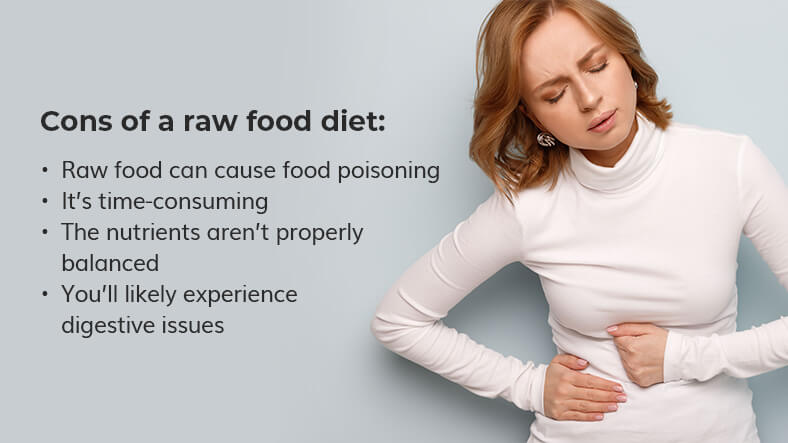
Though there may be some raw food diet benefits, there are more disadvantages you also need to know about. For some people, these cons can make the diet impossible or impractical to follow.
Raw Food Can Cause Food Poisoning
Cooking foods actually eliminates toxic chemicals and bacteria that can cause food poisoning. So cooking makes some food safer to eat. That’s why you need to be careful when eating raw food.
According to the Centers for Disease Control and Prevention, some foods that can cause food poisoning are raw meats, raw eggs, unpasteurized milk and raw shellfish.
It’s Time-Consuming
When you follow the raw food diet plan, you’re going to have to make your own meals from scratch every day. If you have a busy schedule, this can be difficult to manage.
That’s why I strongly suggest choosing foods that are healthy and unprocessed rather than relying on a straight, raw food diet at all times.
The Nutrients Aren’t Properly Balanced
Though the nutrients you consume from raw foods are highly concentrated, they’re not completely balanced. Most people struggle to get enough protein when they follow this diet plan.
You’ll also struggle getting in enough calories and certain vitamins and minerals. Though you may be able to supplement those nutrients that you’re missing, those supplements can cost a lot of money.
You’ll Likely Experience Digestive Issues
The average modern diet is sorely lacking in fiber and the raw diet more than makes up for that. Though this might sound like a benefit, it can easily become a downside. Eating tons of fiber, especially when you’re not used to it, can leave you with serious digestive issues.
You may experience bloating, constipation, stomach cramps, and excessive gas just to name a few.
So, Should You Do It?
This type of diet is very restrictive in what you can and can’t eat. And in my research I haven’t been able to find many confirmed benefits for being on this type of diet.
Additionally, not cooking some of the foods on the raw diet list increases the risk of food poisoning. Because of this risk, I believe that you shouldn’t start this diet on your own.
My advice is that you should contact your doctor first and discuss if this diet will be good for you or not. Your doctor will know best if the health risks are too big or not.
Let me know in the comments if there are other diets or topics you want me to write about!
Love Rachael xx
